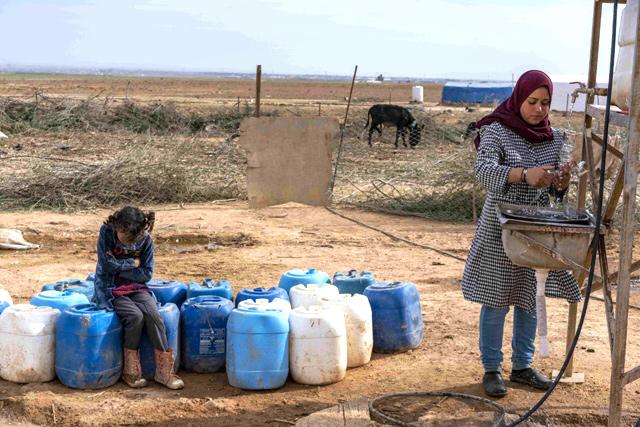- Local News
- Sun-2021-08-22 | 03:26 pm

Nayrouz News Agency :
Young people living in Jordan are among those at risk of the impacts of climate change, which threatens their health, education and protection, according to a UNICEF report launched on Friday.
"The Climate Crisis Is a Child Rights Crisis: Introducing the Children’s Climate Risk Index” is the first comprehensive analysis of climate risk from a child’s perspective, UNICEF said in a statement.
The report ranks countries based on children’s exposure to climate and environmental shocks, such as cyclones and heat waves, as well as their vulnerability to those shocks, based on their access to essential services.
The report, launched in collaboration with Fridays for Future on the third anniversary of the youth-led global climate strike movement, found that approximately 1 billion children — nearly half the world’s 2.2 billion children — live in one of the 33 countries classified as "extremely high-risk”.
The findings reflect the number of children impacted today; figures likely to get worse as the impacts of climate change accelerate, UNICEF said.
While Sudan and Yemen are among these "extremely high-risk” countries, ranking of 15 and 23 consecutively, Jordan ranks at 94, preceded by Japan and followed by Kyrgyzstan. The report found Jordanian children are exposed to water scarcity risk followed by air, soil and water pollution.
"The climate crisis is a child’s rights crisis,” said Tanya Chapuisat, UNICEF Jordan Representative.
"Every child in Jordan is now exposed to at least one climate or environmental shock. These hazards will increase in severity as the impacts of climate change accelerate.”
An estimated 850 million children globally — one in three worldwide — live in areas where at least four of climate and environmental shocks overlap. As many as 330 million children — one in seven worldwide — live in areas affected by at least five major shocks.
The report also reveals a disconnect between where greenhouse gas emissions are generated, and where children are enduring the most significant climate-driven impacts.
The 33 extremely high-risk countries collectively emit just 9 per cent of global CO2 emissions. Conversely, the 10 highest emitting countries collectively account for nearly 70 per cent of global emissions. Only one of these countries is ranked as "extremely high-risk” on the index.
Without action to reduce greenhouse gas emissions, children will continue to suffer. Compared to adults, children require more food and water per unit of their body weight, are less able to survive extreme weather events, and are more susceptible to toxic chemicals, temperature changes and diseases, among other factors, the UN agency said.
UNICEF is supporting the Government of Jordan in its national climate change policy that includes children’s perspectives. UNICEF also integrates greening and climate-friendly initiatives across its programmes, the statement said.
At the community level, UNICEF strengthens their resilience to climate change, especially that of most vulnerable people.
This is carried out by raising their awareness to the risks of climate change, and empowering them, especially young people, to influence national policies.
These actions can make a significant difference in the ability to safeguard children’s futures from the impacts of climate change, read the statement.
"Climate change action cannot wait. We need to work collectively to prioritise and strengthen climate actions in line with the Convention on the Rights of the Child, which Jordan has ratified in 1991,” Chapuisat said.
"The convention presents us with an opportunity to better address the unfair climate change related challenges many vulnerable children in the country are facing,” Chapuisat said.
UNICEF is calling on governments, businesses and relevant actors to:
(1) Increase investment in climate adaptation and resilience in key services for children. To protect children, communities and the most vulnerable from the worst impacts of the already changing climate, critical services must be adapted, including water, sanitation, and hygiene systems, health and education services.
(2) Reduce greenhouse gas emissions. To avert the worst impacts of the climate crisis, comprehensive and urgent action is required. Countries must cut their emissions by at least 45 per cent (compared to 2010 levels) by 2030 to keep warming to no more than 1.5 degrees Celsius.
(3) Provide children with climate education and greens skills, critical for their adaptation to and preparation for the effects of climate change. Children and young people will face the full devastating consequences of the climate crisis and water insecurity, yet they are the least responsible. "We have a duty to all young people and future generations.”
(4) Include young people in all national, regional and international climate negotiations and decisions, including at COP26. Children and young people must be included in all climate-related decision making.
(5) Ensure the recovery from the COVID-19 pandemic is green, low-carbon and inclusive, so that the capacity of future generations to address and respond to the climate crisis is not compromised, the statement concluded.









